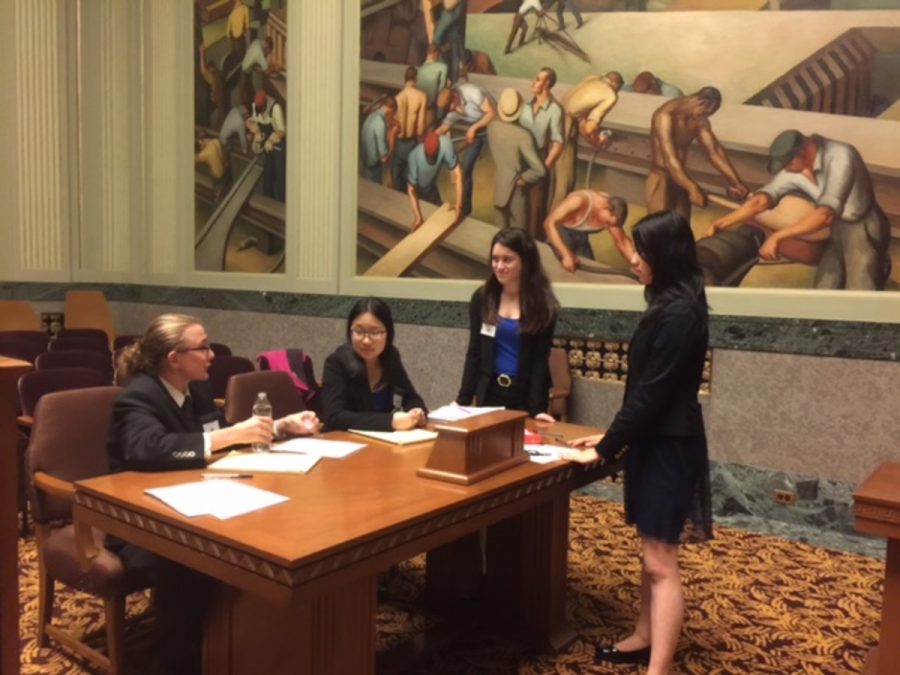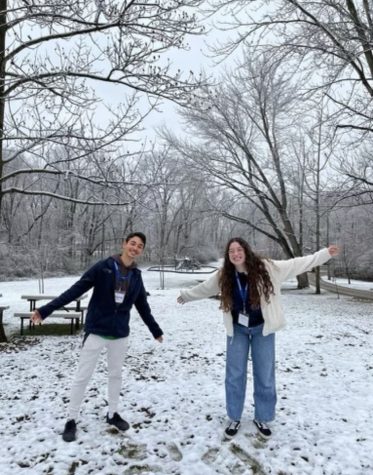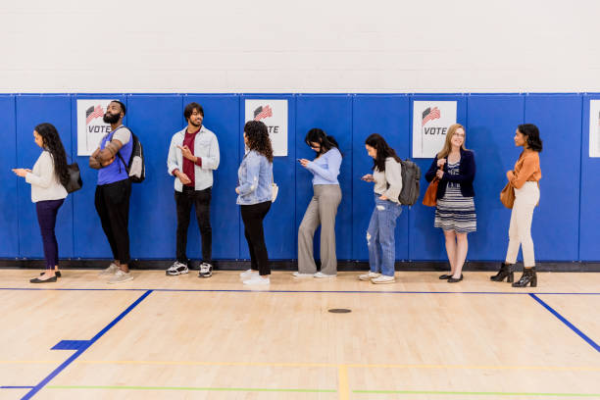Sycamore Justice League overcomes ‘super’ challenges
TEAMWORK. The Sycamore Justice League goes over last minute notes just before juniors Jenna Bao and Ryan Tufts compete in a preliminary round at the Ohio Supreme Court. “I had so much fun, mostly because of the people that were a part of it. We were really pressed for time but that almost added to the fun of it. We could share our stress with each other and bond over that,” Tufts said.
The 2017 SHS Moot Court team, the Sycamore Justice League, had quite the tumultuous season. Two Mock Trial members, junior Jenna Bao and senior Sarah Horne, decided to form a team for Moot. However, the Mock Trial season did not end for SHS until mid-March when the Varsity mock team advanced to the state competition.
The moot court case materials were released in December, but by the time SHS got started, participants had less than a month before their first deadline, and the competition itself was May 5.
The team consisted of Horne, Bao, junior Ryan Tufts, sophomore Carolyn Zhang, and junior Sydney Evans, who helped write the brief. Bao and Tufts were on the petitioner’s side, and Horne and Zhang argued for the respondent.
Most people have never heard of Moot Court; the activity is essentially a simulation of the appellate court process in which student attorneys “argue” with the judges, and not other students, and write a legal brief. The OCLRE (Ohio Center for Law Related Education) creates a fictional case, and teams must prepare to argue for both sides using real case law.
“With Moot Court, you really have to learn to think on your feet. That was something I’m still working on and something I will definitely work on for next year,” Tufts said.
One major component of the program is writing an 18-page legal brief to be submitted and graded prior to the actual day of competition. SHS’ team chose the respondent’s (defense) side.
“One of the hardest things was pulling everything together in time. That was one of the main challenges in writing our brief. It had to be of a reasonable quality, and yet we only had a week to do it. But thankfully we had five people working on it and a really great legal adviser so we were able to get everything done just in time,” Zhang said.
With Moot Court, you really have to learn to think on your feet.
— Ryan Tufts, 11
The brief score accounted for 40 percent of the team’s total performance, and special awards were given for the brief at state. SHS won the best respondent brief.
“When we found out that we won best brief, my first thought was ‘they must have made a mistake,’ because we had significantly less preparation than I think almost everyone there. I thought I heard wrong, but then I looked around at my teammates and they all had the same dumbstruck expressions. In that moment it didn’t matter if we moved on past the preliminary rounds because…I was on top of the world,” Zhang said.
The second element of moot court is oral argumentation: participants prepare speeches to defend their positions and present to panels of judges who question and challenge their arguments and knowledge of the law. (These judges were attorneys volunteering with the program.)
In putting it all together, the Justice League faced a few challenges in its short season. The students received aid from English teacher Mr. Andrew Oakes, who also coached Mock Trial this year. However, since the Oakes’ welcomed a new child on May 3, he was unable to join the team at competition. Further, the final weeks of preparation coincided with the time that many team members had class finals and AP exams. Additionally, the team’s legal adviser was unable to continue working with the team in their last few weeks due to personal reasons.
Nonetheless, the team met in the evenings and during ACE/lunch as often as possible. Food was very often involved, and team members quickly developed close friendships.
“I think one of the best parts was the relationships I made with all my teammates…Our late-night practices and inside jokes…it was one of the best experiences of my high school year, much like Mock Trial. We were always having fun during meetings, even when it was high stress,” Zhang said.
In that moment it didn’t matter if we moved on past the preliminary rounds because…I was on top of the world.
— Carolyn Zhang. 10
On May 5, the fourth annual OCLRE Moot Court competition took place in Columbus at the Ohio Supreme Court. The team headed to Columbus where the competition began at 9:00 a.m. with four preliminary rounds. Teams with the highest scores (calculated by brief scores and oral argument win-losses) after all four advanced.
The team advanced to the quarterfinals where they ultimately lost to Springfield (the competition’s runner ups).
“Moot Court was an amazing experience educationally and socially. It was remarkable to learn about the law and engage in a trial with professional lawyers. Socially, I am very grateful for the strong friendships and mental determination of the team,” Horne said.














